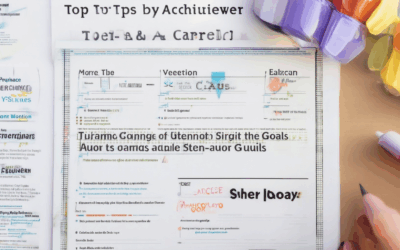In today’s fast-paced and highly competitive professional environment, mental toughness has emerged as a critical skill for success. Employees across industries frequently encounter challenges that test their resilience, focus, and ability to adapt under pressure. Whether navigating stressful deadlines, managing competing priorities, or learning to embrace failure as a stepping stone rather than a setback, cultivating mental toughness is essential for thriving in the workplace. This article delves into actionable strategies and insights designed to help professionals develop the mental strength needed to excel in their roles while maintaining emotional balance and fostering positive relationships.
Key Takeaways
- Develop a robust mindset by setting clear, achievable goals, fostering positive thinking, prioritizing self-care, building resilience, surrounding yourself with positive influences, engaging in continuous learning, embracing a growth mindset, and seeking support.
- Strengthen emotional resilience through self-awareness, developing emotional intelligence, building a supportive network, practicing gratitude, limiting negative influences, finding emotional release channels, cultivating empathy, setting personal boundaries, learning from adversity, and maintaining meaningful connections.
- Master mental strength by recognizing its role in managing emotions, addressing signs of weakness, identifying root causes, and employing strategies such as challenging negative thoughts, setting achievable goals, seeking support, prioritizing physical health, practicing gratitude, and considering professional help.

What Are the 4 Cs of Mental Toughness?
The “4 Cs” model is a widely recognized framework for understanding and developing mental toughness. It consists of four key components:
- Confidence : This involves having faith in oneself, which enables you to handle criticism, uncertainty, and setbacks with poise. It’s the foundation that allows you to approach challenges with optimism and trust in your abilities.
- Control : This refers to managing your emotions, thoughts, and reactions effectively. It empowers you to remain calm under pressure and respond thoughtfully rather than acting impulsively.
- Commitment : This is about staying focused and motivated, even when progress is slow or challenging. It involves aligning your actions with your values and goals, ensuring you persist through difficulties.
- Challenge : Seeking opportunities to grow and learn from experiences, embracing discomfort and uncertainty as a pathway to development. It’s about viewing challenges as stepping stones rather than obstacles.
These four components work synergistically, helping individuals build resilience, adaptability, and overall well-being. By nurturing each area, you can enhance your mental toughness and achieve long-term success.
How to Train Yourself to Be Mentally Tough
To develop mental toughness, consider incorporating the following strategies into your daily routine:
-
Embrace a Growth Mindset
Cultivate the belief that your abilities can be developed through dedication and hard work. This mindset helps you view challenges as opportunities for growth rather than insurmountable obstacles.
-
Practice Gratitude Daily
Start each day by reflecting on what you’re grateful for. This habit fosters positivity and helps you maintain perspective during difficult times.
-
Set Clear, Achievable Goals
Define your objectives with specificity, ensuring they are measurable, relevant, and time-bound. Break larger goals into smaller, manageable tasks to stay motivated.
-
Engage in Regular Physical Activity
Exercise is a powerful tool for building mental resilience. Whether it’s through running, yoga, or weightlifting, physical exertion releases endorphins that improve mood and cognitive function.
-
Mindfulness and Meditation
Spend time each day practicing mindfulness or meditation to reduce stress and increase self-awareness. These practices help you remain calm under pressure and make clearer decisions.
-
Limit Negative Inputs
Reduce exposure to negative influences, whether from people, media, or environments. Surround yourself with uplifting and supportive individuals who encourage your growth.
-
Learn from Mistakes
View failures as stepping stones rather than setbacks. Analyze what went wrong and use the lessons to improve your approach moving forward.
-
Prioritize Self-Care
Make time for activities that recharge your mind and body, such as sleep, nutrition, and hobbies. A well-nurtured mind is better equipped to handle challenges.
-
Stay Curious and Continuously Learn
Approach life with curiosity and a desire to learn. Engaging in new experiences and knowledge keeps your mind sharp and open to change.
-
Develop a Positive Outlook
Train your brain to see challenges as temporary and surmountable. Maintain a optimistic attitude to stay motivated and resilient in the face of adversity.
By consistently applying these strategies, you can build mental toughness and develop the strength to overcome any obstacle.

How to Increase Mental Stamina for Work
Mental stamina for work refers to your ability to stay focused, motivated, and sharp during work hours despite challenges. Here are effective strategies to enhance your mental stamina:
1. Prioritize Sleep
Ensure you get adequate sleep, as it significantly impacts cognitive function. Aim for 7-9 hours per night to support brain health and mental clarity.
2. Maintain a Healthy Diet
Consume foods rich in omega-3 fatty acids, antioxidants, and vitamins to support brain function. Include fish, nuts, seeds, berries, and leafy greens in your meals.
3. Engage in Regular Physical Activity
Exercise improves blood flow to the brain, boosting mental clarity and focus. Incorporate activities like walking, yoga, or strength training into your routine.
4. Practice Mindfulness and Meditation
Regular mindfulness or meditation sessions can reduce stress and improve concentration. Even a few minutes daily can make a significant difference.
5. Optimize Time Management
Use tools like planners or digital task managers to organize your tasks efficiently. Break projects into smaller, manageable steps to avoid feeling overwhelmed.
6. Set Realistic Goals
Establish achievable objectives to maintain motivation and reduce the risk of burnout. Celebrate progress to keep yourself inspired.
7. Build Strong Social Connections
Connect with colleagues and peers to foster a sense of belonging. Positive social interactions can boost morale and mental stamina.
8. Limit Multitasking
Focus on one task at a time to enhance efficiency and reduce mental fatigue. Avoid switching tasks frequently to maintain optimal focus.
9. Reduce Screen Time
Minimize unnecessary screen usage to minimize distractions and improve concentration. Designate specific times for work-related screen activities.
10. Learn to Say No
Protect your mental health by setting boundaries. Decline tasks that exceed your capacity to avoid burnout and maintain productivity.
11. Take Strategic Breaks
Step away from your work periodically to refresh your mind. A short walk or a quick stretch can reignite your focus and stamina.
By implementing these strategies, you can enhance your mental stamina, leading to improved productivity and job satisfaction.

How to Fix a Weak Mindset
To address a weak mindset, consider implementing the following structured approach:
- Set Clear, Achievable Goals : Begin by defining SMART goals – Specific, Measurable, Achievable, Relevant, Time-bound. This clarity fosters direction and confidence.
- Cultivate Positive Thinking : Practice gratitude and challenge negative thoughts. Use affirmations and cognitive-behavioral techniques to shift your mindset towards positivity.
- Prioritize Self-Care : Focus on physical health through regular exercise, adequate sleep, and nutritious meals. Consider routines that include mindfulness or meditation to manage stress effectively.
- Build Resilience : Face challenges head-on and learn from failures. Engage in volunteer work or community service to enhance empathy and confidence.
- Surround Yourself with Positives : Identify supportive influences and establish boundaries with those who negatively impact your energy. Focus on uplifting relationships.
- Continuous Learning : Engage in lifelong learning through reading, courses, or hobbies to keep your mind active and open to new perspectives.
- Adopt a Growth Mindset : View challenges as opportunities for growth rather than obstacles. Emphasize progress over perfection to reduce pressure.
- Seek Support : Talk to trusted individuals or professionals for guidance and new strategies to strengthen your mindset.
By systematically addressing these areas, you can build a stronger, more resilient mindset over time.
How to Become Strong Emotionally
To cultivate emotional strength, consider adopting the following habits and strategies:
- Practice Self-Awareness : Regularly reflect on your emotions and recognize triggers. Understanding your emotional patterns helps in managing them effectively.
- Develop Emotional Intelligence : Enhance your ability to identify and process emotions. This involves learning to label feelings and respond thoughtfully rather than react impulsively.
- Build a Supportive Network : Surround yourself with positive influences who encourage growth and provide constructive feedback.
- Engage in Gratitude Practice : Daily reflection on things you’re grateful for fosters resilience and positivity.
- Limit Negative Inputs : Reduce exposure to toxic environments or people who drain your energy.
- Seek Emotional Release Channels : Express emotions through journaling, physical activity, or creative outlets.
- Cultivate Empathy : Understand others’ perspectives to strengthen relationships and deepen connections.
- Set Personal Boundaries : Protect your emotional well-being by establishing limits on what you accept from others.
- Learn from Adversity : View challenges as opportunities for growth and develop problem-solving skills.
- Stay Connected to Meaningful Goals : Maintain purpose and direction, which contributes to emotional stability.
By integrating these practices, you can build emotional strength, enabling greater confidence and resilience in life.

Understanding Mental Strength
Mental strength is often misunderstood. It’s not about being inherently strong, but rather about managing emotions, thoughts, and behaviors effectively. If you’re feeling mentally weak, it may indicate that you’re dealing with self-sabotage, fear, or doubt.
Common Signs of Mental Weakness
- Procrastination: Avoiding tasks due to fear of failure or self-doubt. (https://7del.net/stop-procrastinating)
- Doubt: Questioning your abilities and second-guessing yourself frequently. (https://7del.net/doubt)
- Avoiding Challenges: Steering clear of difficult situations or tasks due to fear of failure or discomfort. (https://7del.net/challenges)
- Overthinking: Getting stuck in analysis paralysis, constantly analyzing decisions rather than acting. (https://7del.net/overthinking)
Root Causes of Mental Weakness
Mental weakness can stem from several factors:
- Fear of Criticism: Concern about what others think, leading to avoidance of challenges or change. (https://7del.net/fear-of-criticism)
- Unrealistic Expectations: Setting standards that are unattainable, causing frustration and discouragement. (https://7del.net/expectations)
- Self-Sabotage: Engaging in behaviors that hinder progress, reflecting a lack of belief in oneself. (https://7del.net/self-sabotage)
- Perfectionism: Obsessively pursuing excellence, which can paralyze progress. (https://7del.net/perfectionism)
Strategies to Build Mental Strength
Challenge Negative Thoughts
When negative thoughts arise, consciously reframe them. Replace self-doubt with affirmations like, “I can handle this, and I’ll keep moving forward.”
Set Achievable Goals
Break large objectives into smaller, manageable tasks. Celebrate each milestone to build confidence and momentum. (https://7del.net/goal-setting)
Become Aware of Self-Sabotage
Identify patterns of self-sabotage and address them. Recognize that these behaviors may stem from fear or lack of confidence. (https://7del.net/self-awareness)
Seek Support
Build a supportive network of friends, family, or mentors who encourage and uplift you. Share your struggles to gain perspective and reduce feelings of isolation. (https://7del.net/support-networks)
Prioritize Physical Health
Physical health significantly impacts mental well-being. Ensure adequate sleep, nutrition, and exercise. Simple activities like walking can boost mood and energy levels. (https://7del.net/physical-health)
Practice Gratitude
Focus on the positive aspects of your life. Keep a gratitude journal to acknowledge daily positives, shifting your mindset towards positivity. (https://7del.net/gratitude-journal)
Consider Professional Help
Consulting a therapist can provide personalized strategies to address mental weaknesses. It’s a sign of strength, not weakness, to seek help when needed. (https://7del.net/mental-health-resources)
Conclusion
Mental strength is a skill that can be cultivated through awareness, proactive strategies, and self-compassion. By understanding your patterns and implementing these techniques, you can build resilience and overcome mental blocks, leading to greater confidence and success. Remember, seeking help is not a weakness but a step toward growth and empowerment. (https://7del.net/personal-growth)




0 Comments